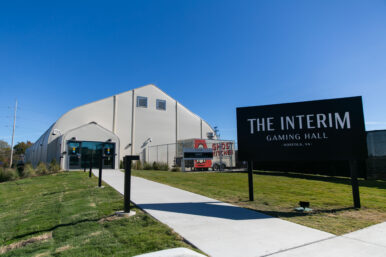SUMMARY:
- A House Judiciary report says GMU president made two false statements in congressional testimony
- Testimony was part of GOP-controlled committee probe into DEI at universities
- GMU law dean alleges in testimony that his school was punished by Washington
- Washington’s attorney calls report “political lynching”
Updated 5:30 p.m. Nov. 7
A staff report produced by Republicans on the House Judiciary Committee accuses George Mason University President Gregory Washington of lying to Congress in his testimony about alleged racial discrimination in the university’s hiring practices.
On July 29, amid four federal probes into George Mason, U.S. Rep. Jim Jordan, the committee’s chairman, and U.S. Rep. Chip Roy, chair of the Subcommittee on the Constitution and Limited Government, called for Washington to testify before the GOP-controlled committee.
The report, citing testimony by Washington and two university administrators, was released late Thursday afternoon by the committee but did not state what its next steps will be. According to an article earlier Thursday in The Washington Post, the committee could recommend a criminal investigation to the U.S. Department of Justice, but the DOJ can make its own decision on whether to pursue it.
In addition to accusing Washington of false testimony, the report cites accusations by Scalia Law School Dean Ken Randall that the president retaliated against the law school for Randall’s decision not to appoint an equity adviser.
Thursday’s report says that Washington “appeared to violate” federal law “by making multiple material false statements to Congress” and that “documents and testimony obtained to date show that GMU likely violated federal civil rights law by discriminating based on race in its hiring practices to advance Dr. Washington’s diversity, equity and inclusion initiative.” It alleges that “the available evidence suggests that Dr. Washington was ultimately responsible for the initiation and implementation of these discriminatory practices at GMU, likely in violation of Titles VI and VII of the Civil Right Act of 1964.”
In essence, the report accuses Washington, George Mason’s first Black president, of discriminating against white, Middle Eastern and Asian job candidates in favor of Black and Latino candidates. In August, the U.S. Department of Education found that the university had violated federal civil rights law “by illegally using race and other immutable characteristics in university practices and policies, including hiring and promotion.”
Douglas Gansler, Washington’s attorney and former Maryland attorney general, called the report “a political lynching” in an interview Thursday. “[Washington] never discriminated against one human being over his five years at George Mason.” He also said that Washington “did not utter one syllable that was not true to Congress.”
The George Mason Board of Visitors released a statement Thursday night noting that it received the staff report from the committee. “We are reviewing the report and consulting with university counsel and counsel for Dr. Washington,” the board said. “The board remains focused on serving our students, faculty and the commonwealth, ensuring full compliance with federal law and positioning GMU for continued excellence.”
U.S. Rep. Jamie Raskin of Maryland, the ranking Democrat on the committee, issued a statement about the report: “In Donald Trump’s gangster state, they pick the target first and figure out the charges later. Today’s target: GMU President Gregory Washington. The Trump Education Department failed to find evidence of employment discrimination at GMU. So Chairman Jordan opened his own investigation. When that one only confirmed Dr. Washington followed Virginia law, Jordan pivoted and conjured up an absurd and convoluted criminal referral based on an alleged lie that takes eight pages to explain.
“If Chairman Jordan cared about perjury, he’d investigate the dozens of administration officials who have lied to and misled federal judges.”
Jordan and Roy, Republican congressmen from Ohio and Texas, claimed in their July 29 letter to Washington that “there is a pervasive culture of intolerance at George Mason that violates the spirit, if not the letter, of the Civil Rights Act. During your tenure, George Mason seems to have engaged in racial discrimination in the hiring and promotion of faculty and staff contrary to both federal statutes and executive order.”
Accusations of lying, sabotage
The committee report accuses Washington of making at least two “material false statements” about allegedly using racial quotas in hiring. Asked about the university’s Anti-Racism and Inclusive Excellence initiative, which was instituted shortly after Washington’s arrival at George Mason in July 2020, Washington said that the hiring plans came from faculty members of each school at the university.
“If units did not want to develop a plan, they did not have to,” Washington is quoted as saying to the committee, according to the report. “There was no, for lack of a better way of putting it, there was no punishment … that we could do to a unit that did not do a plan.”
The report states that the committee obtained documents and testimony that “Dr. Washington and his deputies actively sought to punish schools that did not comply with his racial discrimination mandates,” including stripping 6% of such schools’ budgets to be reallocated to other schools using DEI hiring plans.
According to the report, Randall testified, “You’d get fired if you didn’t have a plan.” Randall allegedly told the committee that he “developed a less ‘metric-driven’ racial discrimination plan because he was concerned that specific numerical hiring targets would violate the law,” and declined to hire an equity adviser for the law school.
After that, Randall testified that Washington “appeared to sabotage a regular American Bar Association accreditation ‘inspection’ of Scalia Law School, telling ABA inspectors that George Mason may be unable to continue to financially support the law school. This jeopardized the law school’s accreditation and resulted in the ABA putting Scalia Law School on probation.”
According to the transcript, Randall said the law school had an ABA inspection in 2022 and received an action letter saying that “they didn’t think that the institution had demonstrated financial soundness.” He testified that the ABA said “it had to do with the exit interview that they had had with the president,” and that Washington “volunteered that he didn’t know whether the university was going to be able to support the law school in the same manner it had previously supported the law school.”
Randall further testified that the president told him “he didn’t remember saying that to the ABA,” and that in a later meeting with Washington and GMU’s former provost, along with other university officials, “the president just started yelling at me and telling me that the ABA would never put us on probation, and that I basically didn’t know what I was doing.”
Later in his testimony, Randall said that Washington “was not a fan of our faculty, to my knowledge. You know, we’re viewed to be the most ideologically conservative unit on campus. I don’t want to guess that’s why he said that.”
Randall, who joined the law school in December 2020 from the University of Alabama, was not available to speak Thursday afternoon, according to his office.
The report also accuses Washington of falsely saying that there was no formal review process of hiring plans by university administration.
Gansler, who attended Washington’s testimony before the committee, added that Washington is not involved in hiring decisions on the faculty level, other than signing off on all new hires, as do the university provost and the Board of Visitors. “Dr. Washington does not oversee the equity advisers [to the university’s schools]. There were never any mandatory dictates.”
Errors cited in report
In addition to the committee’s accusations of false testimony, the Judiciary report says Washington made “numerous incendiary and offensive racial comments intended to influence hiring decisions.” However, the report appears to incorrectly attribute at least one section of testimony to the wrong person, based on transcripts of interviews released by the committee Thursday afternoon.
The report says in a footnote that Naoru Koizumi, associate dean of research at GMU’s Schar School of Policy and Government, testified in October that Washington allegedly told members of a faculty search committee that they should “give the brother a chance,” regarding a Black candidate for the university’s vice president for research hiring process. Koizumi, however, is not cited as saying this in her testimony.
Instead, law dean Randall made the statement in his testimony, according to the transcript.
“This is hearsay,” Randall testified. “I did not hear President Washington say this. But … he wanted a candidate [for vice president for research] who did not make it to the short list, and that the comment that gets attributed to the president is he said just — ‘Oh, come on. Just give the brother a chance.’ And then ultimately this person was hired as the VP.”
Koizumi’s legal counsel, Lloyd Liu of Bennett LoCicero & Liu (BLL), said Thursday that he has requested that the committee correct two errors in the report:
“On page 11, [note] 58, the committee’s report alleges that President Washington told others to ‘give the brother a chance.’ It incorrectly cites Dr. Koizumi’s testimony. Dr. Koizumi never testified that she heard President Washington make that statement or anything like it,” Liu said in a statement. “Also, on [page] 12 [footnote] 73 of the report, the committee cites Dr. Koizumi’s testimony for the notion that the hiring practices may have been ‘unconstitutional and illegal.’ However, Dr. Koizumi never testified about the legality of the practice and has no opinion of it.”
Russell M. Dye, communications director and senior counsel for the Judiciary Committee, said in an email Friday that the report did not have errors.
Regarding footnote 58, he wrote, “The committee report alleges that Dr. Washington hired ‘an African American candidate, who was added to a faculty search committee shortlist because of the candidate’s race, as GMU’s Vice President for Research, telling others that they should ‘give the brother a chance.’
“To support this assertion, the report correctly cites GMU Law Dean Ken Randall’s testimony to the committee. The report also cites Dr. Koizumi’s testimony to the committee because during her deposition, Dr. Koizumi explained in detail how the African American candidate was only added to the faculty committee shortlist after the committee was encouraged to add underrepresented diversity.”
Regarding footnote 73, Dye wrote, “The committee’s report does not assert Dr. Koizumi testified that GMU’s hiring practices were unconstitutional and illegal. Dr. Koizumi’s testimony is cited in footnote 73 to support the earlier part of the sentence noting that Hispanics and African Americans are considered underrepresented minorities at GMU, which is what Dr. Koizumi explained during her deposition as noted on page 67 of the deposition transcript.”
According to George Mason’s website, Andre Marshall is vice president for research, innovation and economic impact and serves as the university’s chief research officer and president of the George Mason Research Foundation. He joined the university in March 2021, after serving as program director at the National Science Foundation and a faculty member at the University of Maryland’s Department of Fire Protection Engineering.
Marshall did not immediately respond to a message Thursday seeking comment on the matter.



